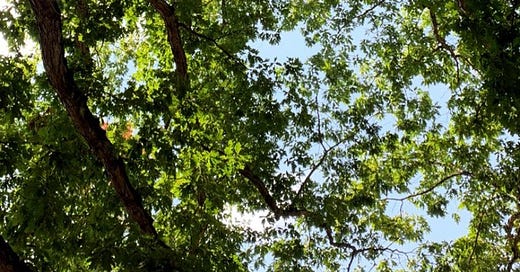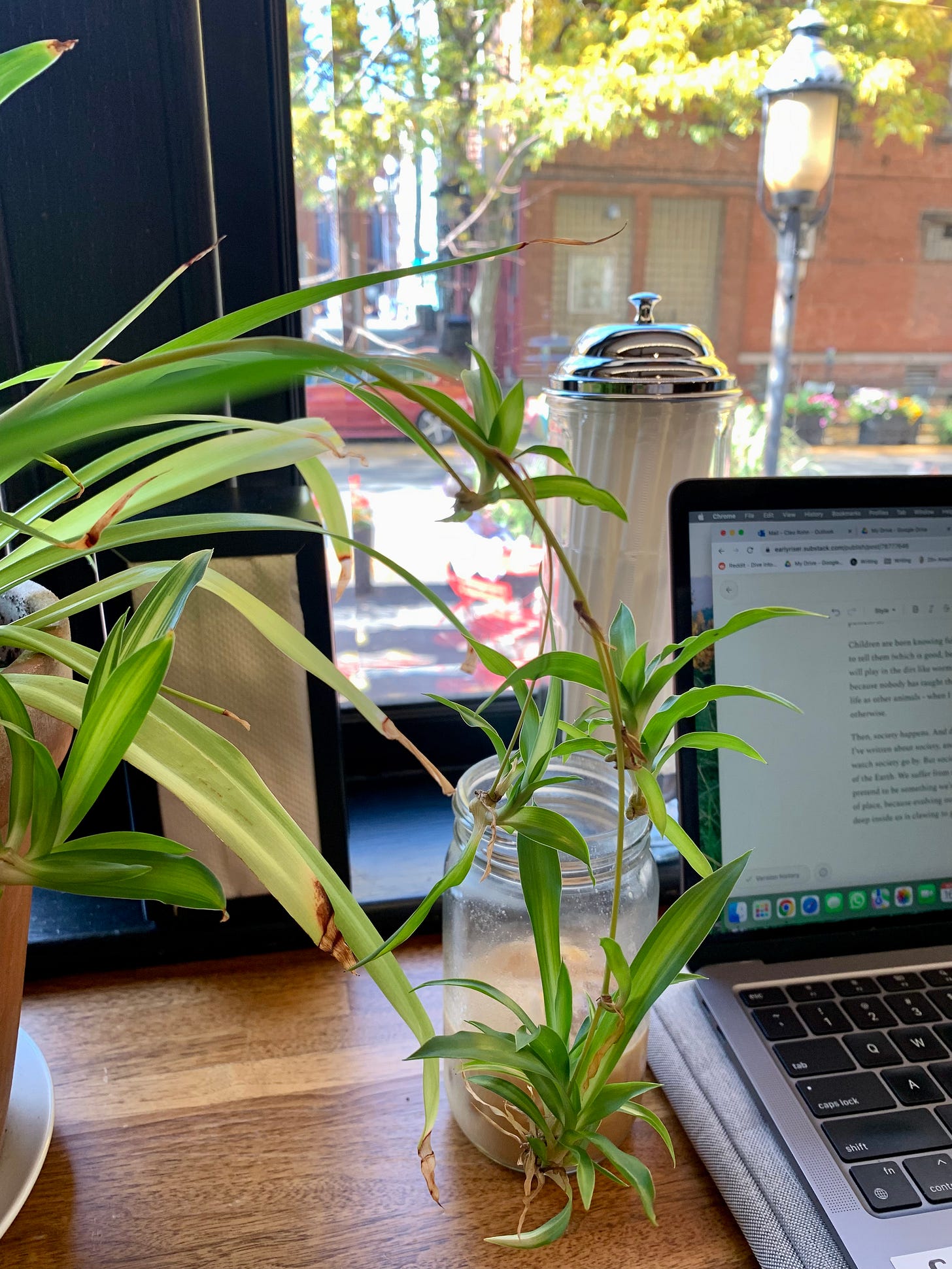We have an owl. His name is George. He lives in the giant oak tree that hangs right over our heads at night. We’ve never seen him, but we know he’s there. In the deep silence of our dark neighborhood, he hoots us to sleep.
Maybe it’s not right to say we have an owl. We don’t own George. We’re probably the more recent arrivals here, the ones who moved into the box beneath his beloved autumn tree. If anything, we are roommates with George, just three animals who decided the same small patch of Earth was suitable for resting.
I doubt George thinks he owns the tree. He knows he’s not alone there at night - from squirrels to songbirds to bugs to bacteria, the tree is home to plenty of quieter creatures. Under the ground, creatures move through the roots, with no regard to property lines or “private” land. They all need the tree, and the tree needs them all.
My partner and I don’t even own this house; we rent it. Yet, we are the ones proudly referring to the oak as “our tree.” How fundamentally goofy. We’ve never even been in it. We’ve never climbed it or fallen asleep in its branches. It’s not that it’s not our tree, it’s just that it’s no more our tree than it is anyone else’s. And of all the beings to live in and around the tree, needing and loving it, we’re the only ones obsessed with claiming to possess it.
Children are born knowing full well that they are creatures of the Earth. Nobody has to tell them (which is good, because nobody does). Left to their own devices, toddlers will play in the dirt like worms. They’ll reach out to touch algae and slimy pond reeds because nobody has taught them about what we’ve decided is “icky”. They’ll act out life as other animals - when I was two or three, I was a tiger, and no one could tell me otherwise.
Then, society happens. And don’t get me wrong, I love society. I’ve studied society, I’ve written about society, and I come to coffeeshops on Sunday mornings to lovingly watch society go by. But society seems hellbent on making us forget we are creatures of the Earth. We stop coexisting and start competing. We stop seeing abundance and start believing only in scarcity. We stop sharing the Earth and start wanting to own it. We become fully convinced that we are above and beyond the natural world - nothing is as important or as smart as we are, and any connection we once had with plants and animals is severed completely in our collective consciousness.
And, in what should be a shock to absolutely no one, it doesn’t work out so well. Since we’ve become convinced that we are separate from the planet, we don’t think twice about degrading, exploiting, and destroying it. We cut down habitats, burn the ozone layer, throw our garbage out the car window. The world hurts because of us. But we don’t get out of this deal okay, either. We suffer from depression, anxiety, and dysphoria, because it’s painful to pretend to be something we’re not. We feel trapped, exhausted, and fundamentally out of place, because evolving ourselves into cages is a process that hurts, and something deep inside us is clawing to get out. Nobody wins in this game.
Teaching in the richest suburb of Washington state showed me a level of disconnection I hadn’t seen before. In a place where nature made itself known with absolutely zero subtlety, I realized how many children had grown up with absolutely no understanding of themselves as animals. Their connection with the world had been severed so early that they had never once questioned their assumed status as the MVPs of the planet. Many of them acted, bought, and flaunted with no real sense of global responsibility or consequence.
These kids are highly intelligent and empathetic people - they certainly were not like this intentionally. But they had been raised in a culture of extreme materialism, competition, and disconnection, and that’s a difficult system to unlearn from the inside. I am so incredibly impressed with the huge amount of students there that are unlearning it anyway. They are climate activists, animal advocates, 16 year-old political visionaries, and my personal heroes. And if they can cultivate that awareness while living in a town where kids make fun of each other for wearing hand-me-down clothes or not having the latest iPhone soon enough, then the rest of us can, too.
This isn’t some sort of environmental manifesto - ultimately, it’s just another sleepy ramble. I’m sure that some of you will read this and roll your eyes. “Oh look, Cleo moved back to the country and went all hippie again.” But moving back to the country was a reminder I really needed, and maybe you need it to. When you live among the animals and the plants, when foxes cross your path as you head into town and owls wake up above you as you fall asleep, the illusion of disconnection starts to splinter. It gets harder and harder to keep up the charade of separation between humans and Earth. The most inconvenient truth is that we’re not as above-it-all as we think we are. We’re not any more entitled to the oak tree that George is, but we need it as much as he does. The only difference is that he knows it and we don’t. We’re natural beings, and the world is waiting desperately for us to start acting like it.






Wonderful.❤️❤️ Now George has to deal with new neighbors tooooooo
Beautiful. I think George knows that you know. That’s why he wishes you goodnight so sweetly.
Brb; rewatching Princess Mononoke and walking barefoot into the mountains.